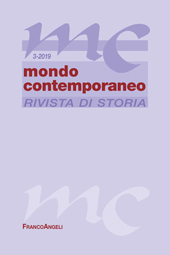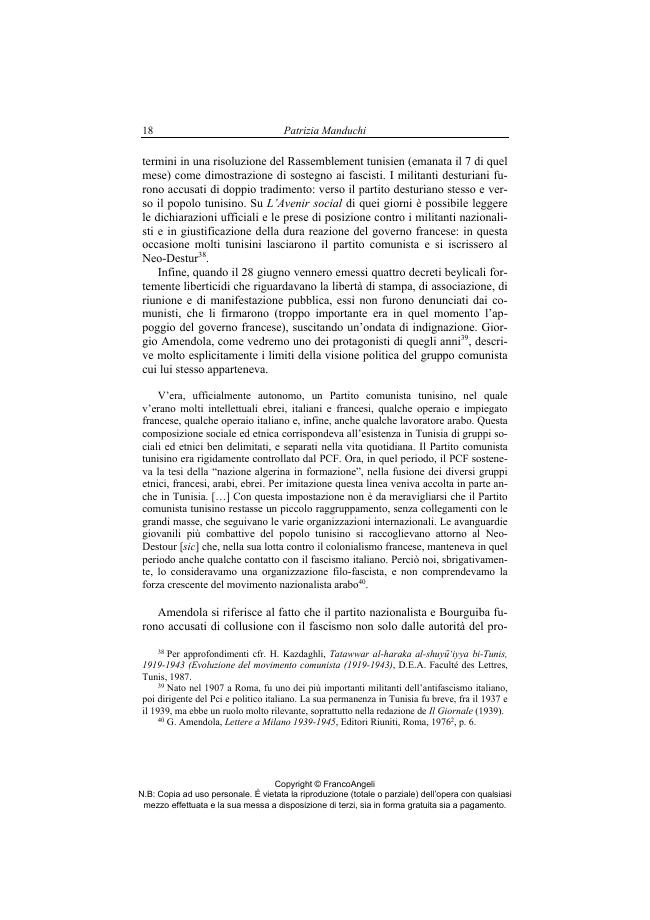Antifascismo, comunismo e nazionalismo in Tunisia : gli anni a Tunisi di Velio Spano (1938-1943)
5-30 p.
Il saggio affronta una fase della storia del Partito comunista tunisino, dominato dalla presenza di militanti e dirigenti italiani, in un periodo importante non solo per la storia della Tunisia, ma anche per quella dell'antifascismo italiano, fra la metà degli anni Trenta e la metà degli anni Quaranta. Il focus è posto sulla figura e il ruolo di un dirigente comunista di origine sarda, Velio Spano, futuro costituente e senatore della Repubblica, che in Tunisia trascorse gli anni fra il 1938 e il 1943, operando attivamente ai vertici del Pct e nella stampa antifascista tunisina in lingua italiana. L'analisi affronta il difficile rapporto fra partito comunista e movimento nazionalista, in particolare il Neo-Destur di Bourguiba.
Ne emerge da un lato un rapporto conflittuale per la sostanziale difficoltà da parte del movimento antifascista in generale, e del Partito comunista tunisino in particolare, a rapportarsi alle tematiche connesse alla questione coloniale, in un momento in cui le forze erano concentrate sulla lotta al nazifascismo e alle vicende belliche; dall'altro sono evidenziabili alcuni tratti di vicinanza poiché la questione coloniale finì per imporsi nel dibattito interno al Partito comunista tunisino, dando avvio a un processo trasversale di presa di coscienza della natura stessa del sistema coloniale e del forte legame esistente fra emancipazione sociale e liberazione nazionale. [Testo dell'editore].
This essay deals with a phase in the history of the Tunisian Communist Party, dominated by the presence of Italian militants and leaders, in a period that is important not only for the history of Tunisia, but also for that of Italian anti-Fascism, between the mid-1930s and the mid-1940s. The focus is on the figure and the role of a Sardinian Communist leader, Velio Spano, future Constituent and Senator of the Republic, who spent in Tunisia the years between 1938 and 1943, working actively at the top of the Tunisian Communist Party and in the anti-fascist Italian press printed in Tunisia. The analysis deals in particular with the difficult relationship between the communist party and the nationalist movement, particularly the Neo-Destur of Bourguiba.
On the one hand a very conflictual relationship is evident, due to the substantial difficulties of the anti-fascist movement (and of the Tunisian communist party in particular) to relate to the colonial question, in a particular moment in which the forces were concentrated on the fight against Nazi-fascism and on the Second World War events; on the other hand, some traces of closeness are evident because the colonial question broke into the internal debate of the Tunisian Communist Party, helping to develop a transversal process of awareness of the very nature of the colonial system and of the strong link between social emancipation and national liberation. [Publisher's text].
-
Articles from the same issue (available individually)
-
-
Information
ISSN: 1972-4853
DISCIPLINES
KEYWORDS
- Tunisia, Partito comunista tunisino, antifascismo, nazionalismo tunisino, stampa antifascista in Tunisia, Velio Spano
- Tunisia, Tunisian Communist Party, Antifascism, Tunisian nationalism, Antifascist press in Tunisia, Velio Spano



